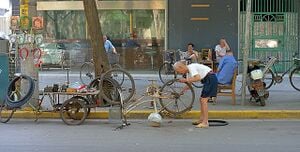
- Four-day week 'an overwhelming success' in Iceland, Jul 5, 2021...[1]
- Spain to launch trial of four-day working week, Mar 15, 2021...[2]
- After the Pandemic, We Can’t Go Back to Sleep, David Graeber, Mar 4, 2021...[3]
2020[edit | edit source]

'Pilot universal basic income and shorter working weeks in Wales', Oct 19[4]
Jacinda Ardern flags four-day working week as way to rebuild New Zealand after Covid-19, May 20[5]
The full impact of Finland’s UBI experiment is in - improving wellbeing, cognitive confidence, and a sense of personal control, May 5[6]
Holland's Sea Ranger Service hugely sequestrates carbon. But it also socially benefits many: the unemployed, veterans, port workers. Feb 7[7]
I pioneered the four-day week – now policymakers must adopt it to fight the climate crisis, Andrew Barnes, Jan 29[8] ...Climate change solutions
2019[edit | edit source]

Finnish Prime Minister Marin calls for a 4-day-week and 6-hour-day for her country, Dec 19[9]
Much shorter working weeks needed to tackle climate crisis, May 22[10] ...UK Climate news 2014 - 2019
'We stopped needing to work in our 30s', Mar 1[11]
It seems the idea of a four-day working week is going mainstream. Onwards to 21 hours? Jan 31[12]
See also[edit | edit source]
- Sustainable livelihood news (latest), 2019-2021, 2017, 2016, 2012-2015, 2007-2011
- Sustainable livelihood
local information can be found, or shared, via our many location pages
References